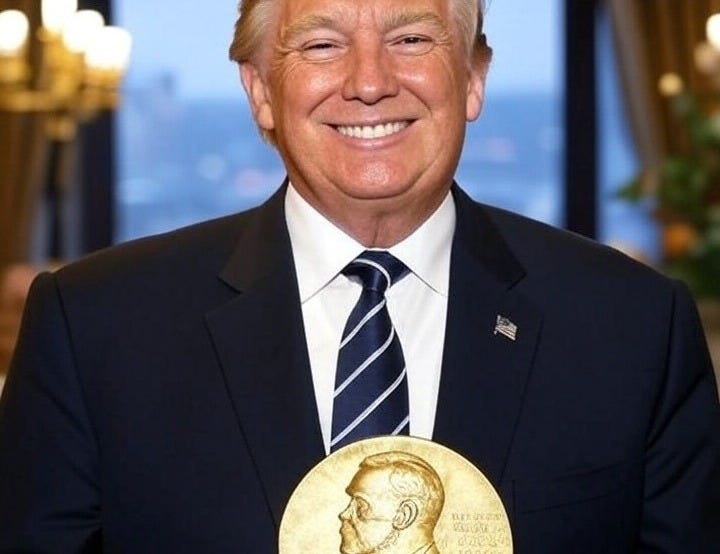Opinion: President Donald Trump Has Changed the World
From the Middle East to the South Caucasus, from Africa to Asia, his peace agreements are rewriting the global narrative.
President Donald J. Trump, through his unorthodox yet effective approach to diplomacy, has brokered a series of historic peace agreements that have reshaped the international landscape. Today’s signing of a peace deal between Armenia and Azerbaijan at the White House marks yet another milestone in Trump’s remarkable legacy as a peacemaker—a legacy that is transforming the world for the better.
The Armenia-Azerbaijan accord, signed by Armenian Prime Minister Nikol Pashinyan and Azerbaijani President Ilham Aliyev, ends nearly four decades of conflict over the Nagorno-Karabakh region. This agreement, centered around the establishment of the “Trump Route for International Peace and Prosperity,” a 20-mile transit corridor linking Azerbaijan to its Nakhchivan exclave, is more than a resolution to a regional dispute. It’s a geopolitical masterstroke, unlocking trade, energy, and connectivity in the South Caucasus while diminishing Russia’s waning influence in the region. The deal, built on the groundwork laid by the Biden administration but brought to fruition by Trump’s decisive leadership.
This latest triumph is no isolated achievement. Since taking office, Trump has brokered peace agreements across the globe, addressing conflicts that have simmered for decades. The Abraham Accords, signed during his first term, normalized relations between Israel and several Arab states, including the United Arab Emirates, Bahrain, and Morocco. This groundbreaking initiative shattered the notion that Middle East peace was unattainable without resolving the Israeli-Palestinian conflict first. The accords opened doors to economic cooperation, cultural exchange, and regional stability, proving that pragmatic diplomacy could yield results where idealism had failed.
Beyond the Middle East, Trump’s second term has seen an extraordinary flurry of peace deals. He mediated a ceasefire between Rwanda and the Democratic Republic of the Congo, halting a conflict that fueled instability in Central Africa. He brokered peace between Cambodia and Thailand, leveraging the threat of withheld trade agreements to bring both nations to the table. The India-Pakistan ceasefire, another feather in Trump’s cap, de-escalated tensions between two nuclear powers, fostering hope for lasting cooperation in South Asia. Agreements between Egypt and Ethiopia and Serbia and Kosovo further underscore Trump’s ability to navigate complex geopolitical fault lines.
Recently, CNN data analyst Harry Enten declared Trump the “most influential president” of the 21st century, citing his transformative policies on tariffs, immigration, and executive orders. This acknowledgment from a traditionally critical outlet underscores the breadth of Trump’s impact, as his peace deals and domestic initiatives reshape both international relations and the American landscape.
What sets Trump apart is his approach: direct, unapologetic, and focused on results over rhetoric. Critics once dismissed his “America First” foreign policy as isolationist, yet his second term has revealed a nuanced strategy that prioritizes strategic engagement. By leveraging U.S. economic and military might, Trump has incentivized nations to choose peace over conflict.
The Armenia-Azerbaijan deal, for instance, includes U.S.-administered development of the Trump Route, ensuring American influence in a region historically dominated by Russia. This isn’t just about peace; it’s about creating opportunities for American businesses and securing strategic advantages for the United States.
Trump’s detractors argue that his predecessors laid the groundwork for some of these agreements, particularly in the Armenia-Azerbaijan case, where the Biden administration advanced negotiations. But diplomacy is not about who starts the race—it’s about who crosses the finish line. Trump’s willingness to dive into the details, as seen in his creative solution to the Zangezur Corridor issue, demonstrates a hands-on commitment that turned potential into reality. His personal engagement, often through direct calls or high-level envoys like Steve Witkoff, has been a catalyst for progress where others stalled.
The impact of Trump’s peace deals extends beyond the immediate cessation of hostilities. The Armenia-Azerbaijan agreement, for example, promises to transform the South Caucasus into a hub of trade and transit, connecting Europe to Central Asia. By reopening borders and fostering economic interdependence, Trump is laying the foundation for sustainable stability. Similarly, the Abraham Accords have spurred billions in trade and investment, proving that peace can be a catalyst for prosperity. These deals are not just signatures on paper; they are blueprints for a new world order where cooperation trumps conflict.
Yet, challenges remain. Trump has struggled to secure high-profile agreements in Gaza and Ukraine, conflicts he vowed to resolve during his campaign. Critics, including some within his own base, question the extent of U.S. involvement in international disputes, arguing it contradicts his “America First” ethos.
Despite these hurdles, the momentum is undeniable. World leaders, from Aliyev to Cambodian Prime Minister Hun Manet and Israeli Prime Minister Benjamin Netanyahu, have publicly endorsed Trump for the Nobel Peace Prize. While Trump himself has openly coveted the award, his focus remains on results, not accolades. As he remarked during the Armenia-Azerbaijan signing, “They fought for 35 years, and now they’re friends, and they’re going to be friends for a long time.” This optimism, grounded in tangible outcomes, is the hallmark of Trump’s diplomacy.
Donald Trump has changed the world—not through lofty promises or endless summits, but through bold, pragmatic dealmaking.



